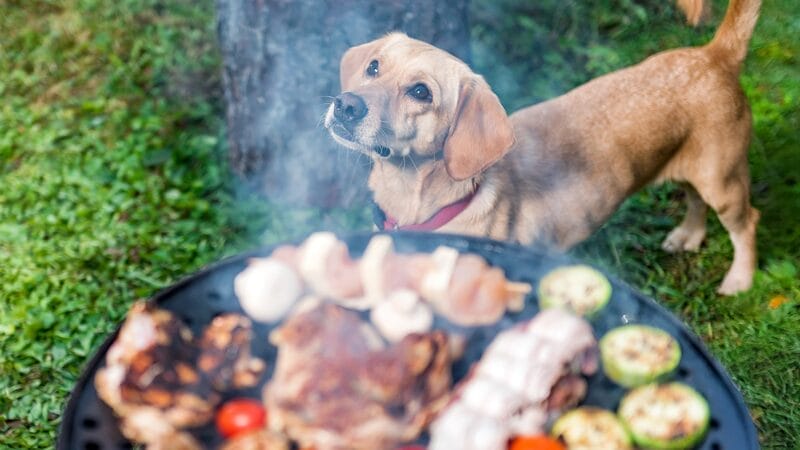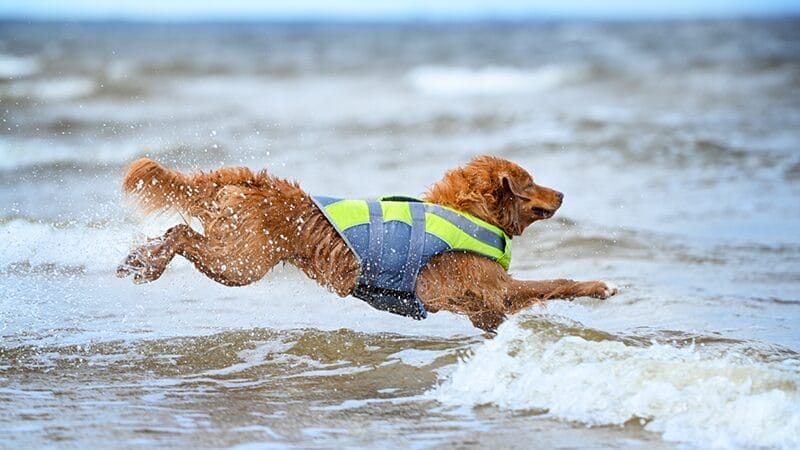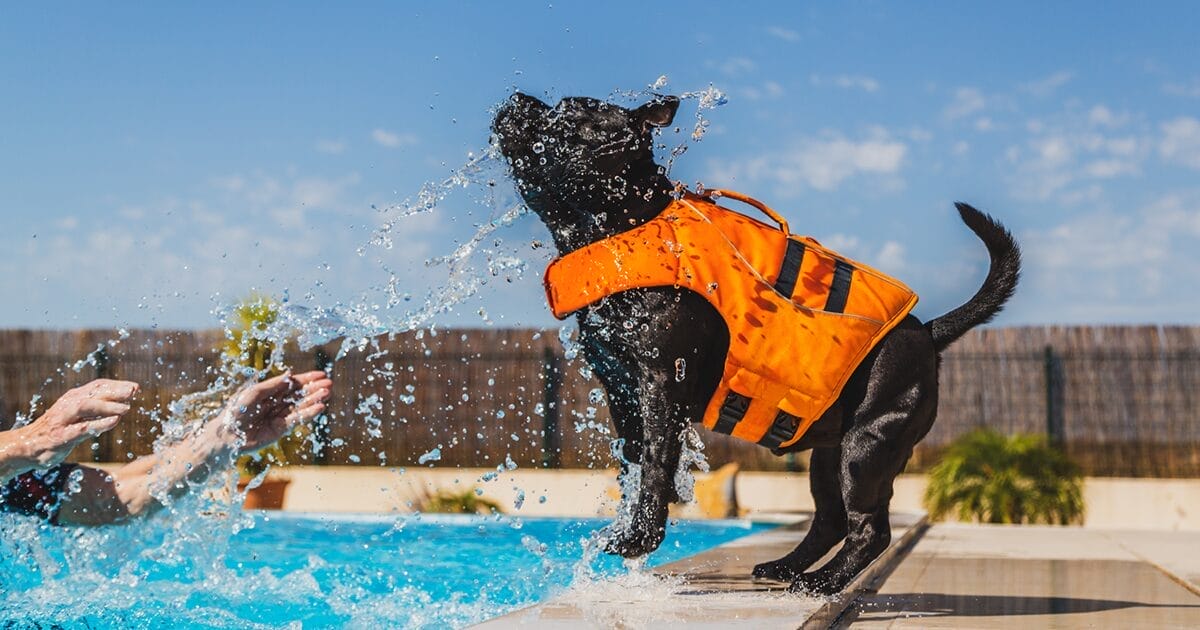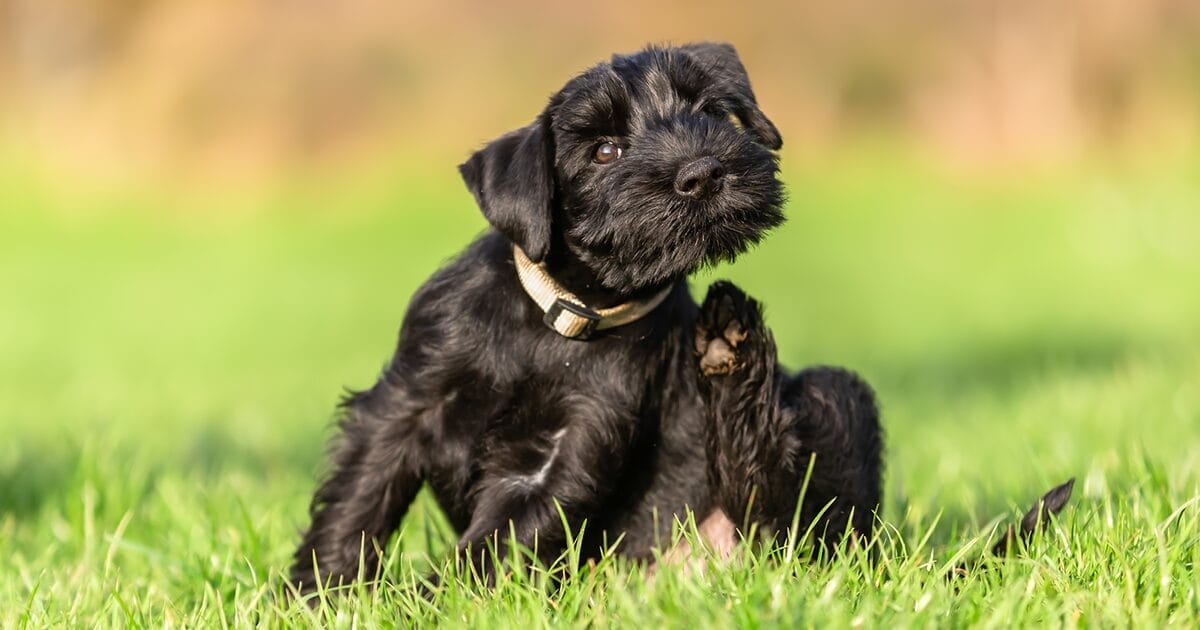
Essential Summer Safety Tips for Your Pets
Enjoy BBQs, fireworks, and other outdoor activities safely with your pets by following these tips to ensure they stay out of the ER.
Barbecues and picnics, walks outside, and warm sunshine—these are just some of the fun summer activities you can enjoy with your pet. To help keep a trip to the ER off your list, our MedVet experts provide these summertime pet safety tips.
Keep Pets Safe at Barbecues and Food Gatherings
- Don’t Share Food with Pets
While it may be tempting to share food with your cat or dog, it’s best to keep your plate to yourself. Fatty meats like hot dogs, brats, and burgers can do more than just cause an upset stomach; they can lead to pancreatitis, a serious illness for pets. Corn on the cob is another potential danger. Pets can swallow chunks that are not digestible, leading to a blockage in their gastrointestinal tract that may require emergency surgery. Alcohol is also poisonous to pets, so make sure drinks are out of reach and clean up any spills promptly.
- Be Aware of Grill Safety
Grills pose another potential danger to curious pets. It’s important to never leave your pet unattended around a hot grill or grill tools. Pets won’t understand the danger and may be tempted to steal a bite directly from the burner. Keep a close eye on your pets in areas where grease drips from the grill or where grill tools are stored. Some pets have been known to lick the dripping grease or even the steel-bristled grate cleaning tool, which can lead to injury or illness. If you’re using charcoal, keep the briquettes out of reach. They might look like a fun treat to a curious pet, but they are dangerous if ingested.
- Clean Up and Secure Trash
Leaving leftovers on a picnic table can tempt curious pets to help themselves, potentially leading to the ingestion of foreign objects that can get stuck in their stomach or intestines. Make sure trash bags are off-limits and secure the lids on trash cans to prevent pets from rummaging through them. Additionally, keep sandwich, potato chip, and other snack bags out of reach, as a pet can suffocate if their nose becomes trapped.

Enjoy the Great Outdoors Safely with Your Pets
- Be Mindful of Open Windows and Balconies
Every year, emergency rooms treat pets that have fallen or jumped from open windows, balconies, and decks. These injuries can be severe, and sometimes the pets cannot be saved. To prevent such injuries, keep your pets away from open windows. If your pet enjoys spending time on a balcony or a raised deck, secure them with a harness and leash, and ensure they are supervised by a responsible adult.
- Protect Pets from the Sun
Did you know that your pet can get a sunburn? While their fur coats offer some protection, they may not provide complete coverage, especially for hairless breeds. Use a sunscreen formula specifically designed for pets.
- Keep in Mind Plants Can be Toxic to Pets
Be thoughtful about the plants you put in your yard or garden, as certain plants can be dangerous to your pets. Lilies, for example, are among the most hazardous flowers, especially for cats. Even a small amount ingested by a cat can lead to severe lily poisoning and acute kidney failure within 12 to 24 hours. Other plants that are extremely dangerous to pets include daffodils, azaleas, crocuses, and sago palms.
Additionally, be aware that certain types of mulch can be hazardous to pets. Cocoa bean mulch, for instance, is made from discarded cocoa bean shells or hulls and can contain theobromine and caffeine, the same compounds that make chocolate toxic to pets. Ingesting this mulch can also cause obstructions that may require surgery. Consider alternative options like rubber mulch or stones. It’s best to consult your veterinarian about the safest products for your specific situation.
- Build a Fence Around Your Compost Area
While compost creates a rich soil for your plants, it can pose health risks to your pets. As organic matter breaks down, mold can grow, and some molds produce hazardous toxins called tremorgenic mycotoxins, which can cause tremors or seizures if ingested. Additionally, if you’ve added any foods or plants that are toxic to pets, they can remain dangerous throughout the decomposition process. Building a fence around your compost area can help keep your pets safe.
- Keep Your Pet Safe Around Water
Water safety is extremely important, whether you’re at the pool, beach, lake, or river. The most important thing you can do is keep a watchful eye on your pet, as curious animals can quickly find themselves in dangerous situations. If you’ll be around water regularly, teach your dog to swim (most cats don’t enjoy being immersed in water) and invest in an appropriate life vest. Our blog post on water safety for pets offers more information.

Protect Your Pets from Insects, Snakes, and Predators
- Protect Your Cat or Dog from Insects
While itchy bug bites can be irritating for pets, it’s important to remember that some parasites, like fleas, ticks, and mosquitoes, can be harmful because they carry diseases. The best way to protect your pet is to ensure they are up to date on their vaccines and to use flea and tick preventatives. Avoid using bug sprays made for humans on your pet. Instead, use products specifically designed for pets and carefully follow the instructions for use and application. For more information, read our comprehensive guide to the insects that commonly irritate pets and how you can protect your companions.
- Watch Out for Snakes
Curious pets can end up too close to a snake while outdoors. To keep your dog or cat safe, use a leash during walks and stay on marked trails. If you encounter a snake, stay calm and move your pet away slowly. If your pet is bitten, try to identify the snake visually, and take a picture if you can do so safely. Contact your veterinarian immediately to determine the next best steps. For more tips on dealing with snakes, read our blog post.
- Protect from Predators
Depending on where you live, native wildlife such as coyotes or bears can pose a danger to your pet. Don’t leave small pets outside unsupervised, especially at dawn, dusk, or nighttime. It’s also best to avoid walking near the edge of the woods at night. Keeping lids on trash cans and storing your pet’s food indoors can help prevent attracting wildlife.
- Stay Away from Skunks
If your curious pet tries to make friends with a skunk, they may end up in a stinky and potentially dangerous situation. Skunks can spray up to 16 feet away, and the spray can cause issues like drooling, conjunctivitis, squinting, temporary blindness, and vomiting. Check out our at-home recipe to remove skunk oils and odor.

Precautions for Pets When Watching Fireworks
Every year, pets are lost, hurt, or even killed after being frightened by fireworks. The loud bangs can trigger a range of fearful behaviors in pets, from mild and non-harmful to destructive. Mild and non-harmful behaviors include whining, staying close to their owners for support, and seeking a hiding place.
Other pets that are extremely fearful of fireworks can become so agitated that they injure themselves or damage their surroundings. If your pet is afraid of fireworks, provide them with a safe spot to hide and help drown out the noise by turning on music. For very fearful pets, consult your family veterinarian about prescription medications that may help. For more tips on helping your pet during fireworks, check out our tips to keep your pet safe during fireworks.
Even the most vigilant pet owners can face a pet emergency. Talk to your family veterinarian about dangers specific to your local area and ensure your pet is up to date on vaccines and medications to keep them healthy and safe. If your pet does experience an emergency, bring them to your nearest MedVet for emergency care.
Visit our Pet Care Resources library for more pet health and safety information.
FAQs
Can my pet eat human food at a barbecue?
Are plants toxic to pets?
Can I use sunscreen and bug spray on my pet?
Learn More
For ways to ensure your pet lives a happier, healthier life, visit our Pet Care Resources library.
Pet Care ResourcesContents
Learn More
For ways to ensure your pet lives a happier, healthier life, visit our Pet Care Resources library.
Pet Care Resources

